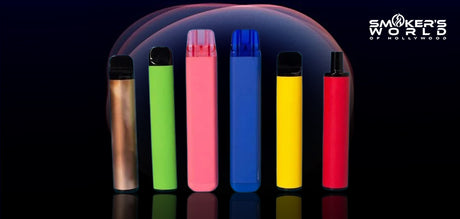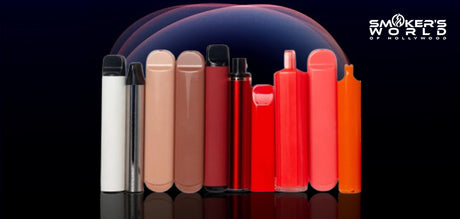Vaping has emerged as a popular trend with various implications for health, safety, and everyday life. Whether you're curious about vaping's impact on oral health, its safety during pregnancy, or its compatibility with air travel, our comprehensive guide covers the essential FAQs. Dive into expert insights and advice to stay informed about vaping.
Your Top Vaping Questions Answered
Q. Can you bring a vape on a plane?
A. Yes, you can bring a vape on a plane, but only in your carry-on baggage or on your person; it's not allowed in checked bags. It's important to prevent accidental activation of the device's heating element during transport, and each lithium ion battery must not exceed a 100 Wh rating, or for lithium metal batteries, a lithium content of 2 grams. For more specific details, visit the TSA's official website (TSA.gov).
Q. Can you get second hand smoke from a vape?
A. While secondhand smoke from traditional tobacco products is widely recognized for its health risks, the CDC outlines concerns about the health effects and risks associated with e-cigarettes or vaping as well. However, the specific mention of secondhand smoke in the context of vaping is not detailed in the provided resource, implying that the primary focus is on the direct user rather than on bystanders to vaping. For comprehensive information on e-cigarettes and their health implications, please refer to the CDC's official page on the topic (CDC).
Q. Can you vape while pregnant?
A. Vaping is not safe for pregnant women. Most e-cigarettes contain nicotine, which is harmful to developing fetuses and can also impact adolescent and young adult brain development, continuing into the early to mid-20s. Nicotine exposure poses a health danger to pregnant women and their developing babies. For more details, you can visit the CDC's page on e-cigarettes (CDC).
Q. Can you vape while breastfeeding?
A. Using tobacco or e-cigarettes while breastfeeding can pass harmful chemicals to the infant through breast milk or secondhand smoke. Despite this, breastfeeding remains beneficial and is recommended. To minimize exposure, it's advised not to smoke near the infant, smoke outside, and maintain a smoke-free environment. Changing clothes and washing hands before handling the infant are also recommended practices (CDC).
Q. Can dentist tell if you vape?
A. Dentists may be able to tell if you vape due to oral health effects linked to tobacco and nicotine use, including gingival recession, impaired healing, oral cancer, mucosal lesions, periodontal disease, and tooth staining. Vaping involves inhaling aerosol from e-cigarettes, which contains nicotine and other chemicals, potentially affecting oral health. For detailed insights, check the American Dental Association's discussion on tobacco use and cessation (ADA).
Q. Can you get herpes from sharing a vape?
A. The risk of transmitting herpes through sharing a vape is considered low, as herpes simplex virus typically requires direct contact for transmission. However, it's not impossible. For safety, avoid sharing vapes and maintain good hygiene practices (Statcare) (Eliquidstop) (Vapebreaker).
Q. Can you get high off a vape?
A. Yes, you can get high from vaping if the device contains substances like THC, which is the psychoactive compound found in cannabis. Devices loaded with nicotine can provide a buzz but not a high in the traditional sense. The intensity of the high depends on the substance vaped, with more potent drugs delivering stronger effects (Morningside Recovery).
Q. Can you vape after tooth extraction?
Vaping after tooth extraction is not recommended due to risks such as dry socket, increased infection risk, delayed healing, and more pain and swelling. Most dental experts advise waiting at least 2-3 days before gently resuming vaping, taking careful precautions when you do start again (Vaporesso).
Q. Can a vape set off a fire alarm?
Yes, vaping can set off a fire alarm or smoke detector, especially in places with sensitive alarm systems like offices and hotels. This is because vapor, similar to smoke, contains small airborne particles that can trigger these alarms. It's generally recommended to vape in designated areas or outside to avoid setting off alarms and facing potential consequences (Vaping Advisor).
Q. Can drug dogs smell vapes?
Drug dogs can detect vape cartridges and pens if they contain substances the dog is trained to find, such as cannabis and nicotine. The detection depends on the dog's training and the specific substance in the vape juice (DoggySaurus).
Q. Why do people vape?
People vape for various reasons, including as an alternative to smoking traditional cigarettes, for recreational use, to relax, socialize, or even as a hobby for cloud chasing and flavor experimentation.
Q. Are vapes bad for you?
While vaping is generally considered less harmful than smoking traditional cigarettes, it's not without risks. Vaping can still have adverse health effects, including respiratory issues and potential nicotine addiction, especially among youth.
Q. Is vape a drug?
Vaping itself is not a drug, but many vaping products contain nicotine, which is a highly addictive substance. Some vaping liquids also contain other substances like THC, the psychoactive component of marijuana, which can have mind-altering effects.
Q. Can smoke detectors detect vape?
Traditional smoke detectors are designed to detect particles associated with smoke from burning materials. Vaping aerosol is different from smoke, so standard smoke detectors may not always detect it. However, there are specialized detectors designed to detect vaping aerosol if needed.
Conclusion:
In conclusion, the world of vaping is a multifaceted landscape with both benefits and risks. While it offers a potential alternative to traditional smoking and has become a popular pastime for many, it's essential to acknowledge the associated health concerns and regulatory challenges. As we continue to navigate this evolving terrain, it's crucial to prioritize transparency, education, and responsible decision-making. By staying informed and promoting open dialogue, we can better understand the complexities of vaping and its impact on individuals and society.






